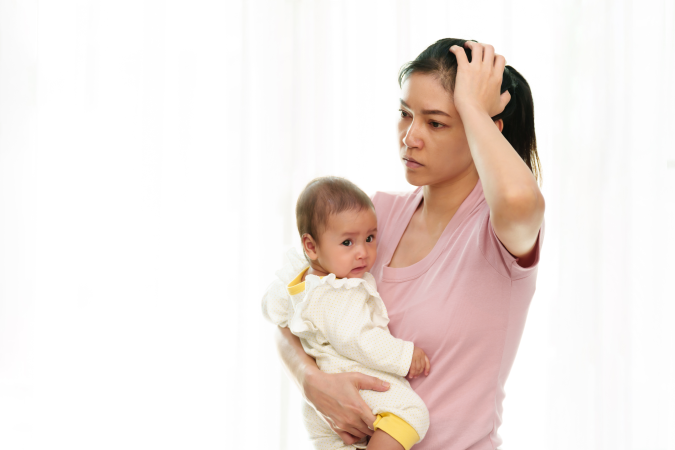October 11, 2024
National Mental Health Month: Focusing on Postpartum Depression

The Centers for Disease Control and Prevention (CDC) estimates about 1 in 7 new mothers suffers from postpartum depression. The rates of postpartum depression can reach 25% or higher, however, among immigrant or refugee mothers, and those facing significant social and economic barriers — especially if they have limited support.
Connect with EveryStep
One study suggests postpartum depression is a common condition among migrant women. It concluded immigrant women were twice more likely to experience depression in the postpartum period than non-immigrant women. Reasons cited included:
- Shorter length of residence in the destination country.
- Lower levels of social support.
- Poorer marital adjustment.
- Perceived insufficient household income.
Another study examined postpartum depression among low-income mothers, particularly those living in rural states like Iowa. It
“About 1 in 7 new mothers suffers from postpartum depression, but rates can reach 25% or higher among immigrant or refugee mothers, and those facing significant social and economic barriers — especially if they have limited support.”
found many mothers in rural areas are at a higher risk for postpartum depression because of financial stress, social isolation and limited access to mental health providers or transportation access to such providers.
A team of researchers from the universities of Iowa and Northern Iowa found one way to improve postpartum health among low-income, ethnic-minority women is to provide “listening visits.” These visits, including home visits, were provided by individuals without a counseling degree; they simply offered an accessible, acceptable and, it turns out, effective way to improve levels of depression. In this study, depressive severity, symptoms and quality of life all improved for the women receiving “listening visits.”
EveryStep’s home visiting nurses provide the kind of “listening visits” that make a difference in the lives of young, low-income and ethnic-minority women in central Iowa. EveryStep’s Community Home Visitation program provides home visits to pregnant and parenting women in Polk County, and is dedicated to improving the health and well-being of pregnant and postpartum women, children and families. Home visits are conducted by registered nurses, a nutrition counselor and a social worker. Services provided include:
- Prenatal and post-partum health education.
- Child development screening and education.
- Perinatal depression screening and referral.
- Caregiver depression screenings.
- Referrals to community resources.
- Nutrition counseling.
- Family planning counseling.
Learn about EveryStep’s Work with New Parents
Many women experience worry, sadness and tiredness after having a baby, a condition often referred to as “baby blues” and these symptoms typically resolve on their own within a few days. Postpartum depression symptoms, however, are more intense and last longer. These symptoms of postpartum depression include:
- Crying more often than usual.
- Feelings of anger.
- Withdrawing from loved ones.
- Feeling numb or disconnected from your baby.
- Worrying that you will hurt the baby.
- Feeling guilty about not being a good mom or doubting your ability to care for the baby.
Depression is treatable and people get better with treatment. The National Maternal Mental Health Hotline is free and available 24/7 for pregnant and new moms in English and Spanish. Call or text 1-833-TLC-MAMA (1-833-852-6262).
If you or someone you know is struggling to find the support they need, please contact EveryStep at 515-558-9946 or complete the commitment-free, confidential “Find Care” form on EveryStep’s website at www.everystep.org/find-care. EveryStep staff will follow up with a phone call to answer your questions and help.
We all face challenges, but some people in our community are coping with more difficult circumstances. EveryStep shows up when people need us most, no matter who they are or what circumstances they face.
The diversity of EveryStep’s programs helps meet a variety of needs at once, and ongoing support over time. You have the power to help those who are struggling in our community.
Consider a Monthly Gift
Together, donors like you can help build a caring, connected community that surrounds children and adults with comfort, dignity and hope — but also practical solutions and a renewed capacity for self-determination. Your support for parents impacts the whole community.